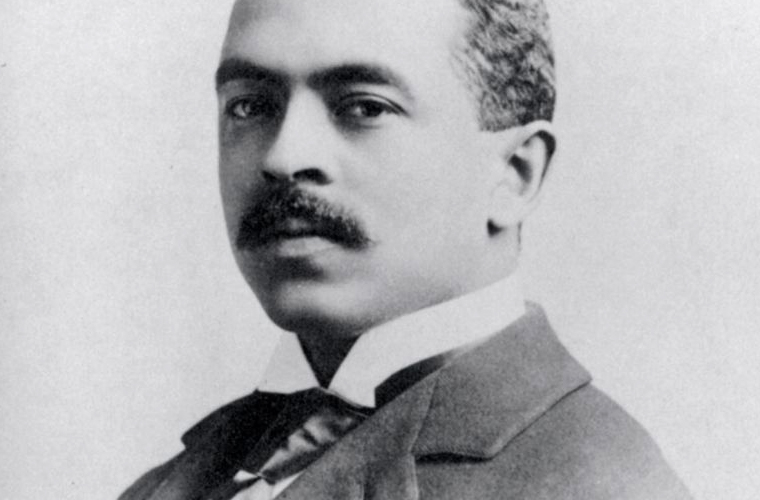William Monroe Trotter was a major early twentieth-century civil rights activist known primarily for launching the first major challenge to the political dominance of Tuskegee Institute founder Booker T. Washington and as an inspiration for the formation of the National Association for the Advancement of Colored People (NAACP). Trotter was also the founder of the Boston Guardian (1901), the National Negro Suffrage League (1905), the Niagara Movement (1905), and the Negro American Political League (1908).
William Trotter was born on April 7, 1872, in Chillicothe, Ohio. His family moved to Hyde Park, Boston, Massachusetts in 1879. At a young age, William has exposed to education and equal rights activism from his father James, who was a rare black Democrat who supported New York’s Grover Cleveland in his successful bid for President in 1884. Two years later, James Trotter was appointed Recorder of Deeds for Washington by President Cleveland, making him the highest-ranking black Federal official at the time. William Trotter’s mother was Virginia Isaac Trotter.
Trotter excelled academically in predominantly white schools in Boston and then entered Harvard College in 1891. Four years later he earned his Bachelor’s degree in international banking with honors (Magna Sum Cum Laude) while becoming the university’s first black Phi Beta Kappa member. A year later, he received an MA degree from Harvard in finance. Restricted from working as a banker because of his race, Trotter worked in his father’s real estate firm. In 1899, he married equal rights activist Geraldine L. Pindell, who in 1901 became the society editor for the Boston Guardian, and was an original member of the NAACP. Mrs. Trotter died in the 1918 flu pandemic, leaving Trotter a widower at the age of 46.
Trotter is best known for his strident opposition to the racially conciliatory policies advocated by Booker T. Washington and his call for a renewed emphasis on liberal arts education in contrast to Washington’s promotion of manual training. Less well-known is his equally forceful opposition to all forms of racial discrimination and segregation.
Trotter’s public challenge of Washington’s policies began in 1901 with his founding of the Guardian, and the Boston Literary and Historical Association, which was a forum designed to attract potential opponents of Washington including, most notably, W.E.B. DuBois. Trotter’s first personal encounter with Washington came in 1903 when he interrupted the Tuskegee, Alabama educator’s address to a National Negro Business League meeting at Boston’s AME Zion Church. Trotter referred to Washington as “the Great Traitor” and “Benedict Arnold” and subsequently was arrested and convicted for disorderly conduct. Trotter spent 30 days in jail because of the conviction. Some civil rights leaders believed that Trotter’s arrest had been orchestrated by supporters of Washington; Trotter quickly became the national symbol of opposition to Washington’s Tuskegee Machine, an organization of Washington supporters who exercised almost dictatorial power over the African American community.
In July 1905, 29 opponents of Washington, including Trotter and W.E.B. DuBois, met in Niagara Falls, Canada to form the all-black Niagara Movement, the first organization to challenge Washington’s power, and the first black-oriented civil rights organization formed in the twentieth century. During the meeting, this group drew up a manifesto, demanding voting rights for African Americans, an end to racial segregation and discrimination, and better health care, housing, and schools for the nation’s black population.
In 1908, Trotter left the organization in opposition to women joining, and the growing prominence of W.E. B. DuBois in the Movement. One year later, Trotter rejoined several Niagara cofounders in helping to establish the NAACP, even though he refused to join the Association because he felt it was compromised by white leadership and financial support. As an alternative, he revived the National Equal Rights League.
Trotter’s outspoken activism also extended to his direct denouncements of President Theodore Roosevelt for discharging three companies of the all-Black 25th United States Infantry after the Brownsville Riot in Texas (1906), and publicly confronting President Woodrow Wilson in 1914 after the new president imposed racial segregation on Federal employees for the first time. Beginning in 1915 Trotter led the Boston protests against the racist motion picture, The Birth of a Nation.
Trotter’s quest for social justice included his urging for a Federal commitment to equal rights before black soldiers participated in the US’s World War I war effort. He was an observer at the 1919 Paris Peace Conference where he called for the end of colonialism in Africa. In the early 1920s, Trotter opposed Marcus Garvey’s Universal Negro Improvement Association (UNIA) and its Back to Africa Movement.
William Monroe Trotter passed away in his Boston home on April 7, 1934. He was 62.

